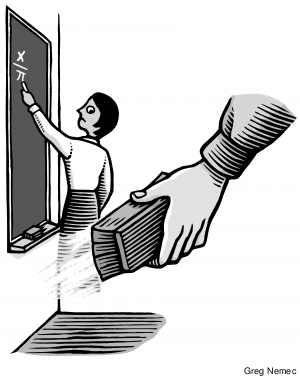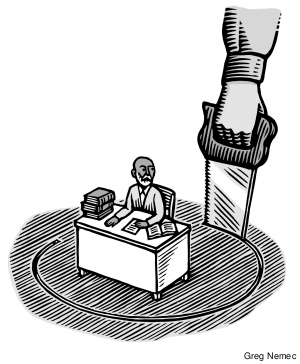On the day before Clarion went to press, the union received a call from 80th Street informing us that Chancellor Goldstein had decided, in response to the letter on the facing page, to delay the vote on a major rewriting of the CUNY Bylaws. Earlier that day, I had sent an e-mail message to all CUNY faculty and professional staff inviting signatures on an electronic petition with the same demand. By the time CUNY called, two hours after the message went out, there were already 300 signatures on the petition; by the end of the day, the total was close to 1,000.
We won a delay in the Board of Trustees vote on the Bylaws revision because of the collective force behind my letter – the PSC’s 22,000 members – and the power we have when we take action together. CUNY’s initial plan of holding the vote in June, after the end of the regular academic year, had every appearance of being an attempt to ram through major Bylaw changes when very few of us were looking. But we were looking, and we were not willing to allow the trustees to vote on a sweeping Bylaws revision, the text of which the University had not even made public.
 |
For many of us, whatever faith we might have had in the trustees’ willingness to protect the rights of the faculty, staff and students has been shaken by recent evidence that they were prepared to take a significant vote without even asking for full or accurate information. The attempt to rush the Bylaws vote also seemed part of a pattern of CUNY policy decisions made after only superficial consultation with faculty and staff, often with no participation by governance or union representatives. High-stakes decisions on such issues as the formation of a new community college, the introduction of a “pre-tenure review” and now the mandate for “a common general education framework,” are too often being made with only the veneer of participation by the faculty and professional staff.
UNKNOWN
Delaying the vote on the proposed Bylaws revision is an important victory, but it alone does not reverse that pattern, or resolve the issue of the proposed changes themselves. As of this writing, we do not know when CUNY plans to reschedule the vote or whether the vote will be on the revisions currently proposed. As you’ll see from the summary on the facing page, the changes proposed for the June vote were unmistakably anti-faculty, anti-professional staff, anti-governance and anti-labor. What’s needed is not just a delay in the vote, but a rethinking of the whole attempt to undo our Bylaws protections. The delay gives us the chance to press for that change.
____________________
Faculty And Staff Rights at Risk in Bylaws Changes
By Peter Hogness
CUNY Central Administration has proposed an extensive series of amendments to the University’s Bylaws. A vote on the changes was originally scheduled for the trustees’ June 27 meeting. That vote has now been postponed; it remains to be seen whether the administration will alter the proposal itself.
While the administration has portrayed this package of changes as largely technical, they would in fact undermine the rights of CUNY faculty and staff in dozens of ways, both large and small. The proposed changes attack longstanding rights and protections of faculty and staff and attempt to increase the power of college presidents, the chancellor and trustees. Many of the proposed amendments appear intended to reverse victories won by the PSC through the grievance procedure.
NO QUALIFICATIONS?
The amendments would eliminate position descriptions and qualifications for most jobs in the PSC bargaining unit. The union contract covers only titles; it does not detail functions of employees. The PSC has been able to ensure the integrity of the titles for both faculty and staff by referring to the descriptions of the duties and qualifications of those positions contained in the Bylaws.
 |
The deletion of position descriptions and qualifications appears intended to eliminate the union’s ability to protect the integrity of job titles. It would open the door for administrators to try and save money by telling employees to do work that should be part of a higher-paid position, or to harass an employee by assigning duties that have nothing to do with the job she or he was hired to do.
Approval of these changes would mean no written standards for all positions in the Higher Education Officer and College Laboratory Technician series, all adjunct faculty positions, Lecturers, Distinguished Lecturers, all Visiting Positions, Continuing Education Teachers, Research Associates and many more, thanks to the deletion of Articles 11.10-11.35 and 11.38-11.45 and 11.44-11.46. This change would undermine standards and accountability in the workplace at City University.
An equally serious threat comes from the proposed amendment to Article 6.1, which would create a number of new positions under the Instructional Staff employment category, without any description of duties or qualifications – for example, “Affiliated Professional.”
“AFFILIATED PROFESSIONAL”
If these changes are adopted, position descriptions and qualifications that still remain could have much less meaning, because CUNY could attempt to assign whatever duties it chooses to the new, undefined positions. In the absence of a job description, colleges might plan to hire Affiliated Professionals and assign them to each teach seven courses per semester, instead of filling tenure-track lines. Current faculty and staff could find themselves not reappointed and then replaced by Affiliated Professionals who happen to perform the exact same duties with less pay, and fewer benefits and job rights.
The proposed changes also move governance decisions away from the faculty and toward high-ranking administrators and the Board of Trustees, by limiting faculty role and influence in one area after another.
POWER TO PRESIDENTS
For example, the amendment to Article 9.1.e would give college presidents the power to remove any member of a departmental personnel and budget committee (P&B). P&B members are elected by their colleagues, but the amendment would allow removal of a member any time that the college’s president decides that “the interests of the college” require it, after merely “consult[ing]” with the department chair. Having such power could allow presidents to control departmental P&Bs.
The proposed amendment to Article 8.6 would mean a broader expansion in administrators’ powers. The Bylaws currently state that “The faculty shall be responsible, subject to guidelines, if any, established by the board…” for formulation of policy on curriculum, granting of degrees, and other academic matters. The amendment would change this to, “This body shall be responsible, subject to the board….”
The most obvious problem is that this change eliminates any mention of the Board of Trustees issuing guidelines as the means for exercising control over educational and academic issues. This could open the door to post hoc review of any faculty decision.
In addition, the current language in Article 8.6 states clearly that CUNY faculty are responsible for policy on curriculum and other areas. Changing the language from “the faculty” to “this body” introduces ambiguity, and might be interpreted as removing these responsibilities from the faculty as a whole.
RETRENCHMENT
The proposed Bylaw revisions also take an axe to protections for tenured faculty in the event of retrenchment. The amendments propose to delete Article 6.9, which spells out requirements for discontinuance of tenured positions and suspension of seniority rights. If these Bylaw changes are approved, it could mean a loss of protections in the event of a retrenchment at CUNY.
 |
Adjunct faculty are also a target of these proposed changes. In addition to eliminating all provisions on qualifications and job descriptions contained in Article 11.11, the proposed amendments eliminate Article 6.7, which provides notification rights for adjuncts in the reappointment process. The PSC has pending grievances arguing that this provision also limits the ability of CUNY to non-reappoint adjuncts without reason.
RIGHTS DELETED
The proposed amendments would restrict or eliminate other rights and protections for faculty and staff in many additional ways. Language in Article 8.9 stating that P&Bs can make recommendations about special salary increments would be deleted. Elimination of Article 6.2.g would remove current protection against discrimination in the tenure process for those who take maternity leave, while changes to Article 13.5 would have a similar effect against those taking child-care leave. Provisions on required dates for notifying junior faculty of tenure decisions would be deleted.
These last few points, and many others, are also covered in the PSC-CUNY collective bargaining agreement. But that does not mean the protections in the Bylaws are redundant – far from it.
As the last few months in Wisconsin have shown, the legal standing of a union contract can sometimes change rapidly and without a lot of warning. Currently New York State law keeps the terms of an expired collective bargaining agreement in full force after the contract expires. However, as reported in the April 2011 Clarion, this provision, known as the Triborough Amendment, is under attack and its repeal is being sought in many quarters. If the Triborough Amendment is repealed, the rights contained in the Bylaws would become a member’s main vehicle for defending his/her rights as faculty or staff. Attempts to eliminate provisions such as Article 7, which ensures academic due process, appear aimed at leaving faculty and staff with as few rights as possible should the Triborough Amendment be repealed.
POWER GRAB
The proposed revisions would affect not only CUNY employees, but also the public at large. On a wide range of topics, such as the Bylaws’ definition of job descriptions, the amendments would eliminate the requirement for the Board of Trustees to act. This would allow many areas of policy to be defined directly by the chancellor and those working under him/her, with no public oversight. Current opportunities for public review and comment before policy decisions are made would be removed.
Overall, the proposed changes add up to a power grab by the administration. They would abolish important guarantees of fair procedure. They would undermine both the rights and the role of faculty and staff. They would mean a decline in clear standards and accountability, to the detriment of the University as a whole.
CUNY faculty and staff should evaluate what is at stake, make sure their colleagues are aware of the changes the administration has proposed, and monitor what next happens to this proposal. To stay current, see psc-cuny.org for updated information

